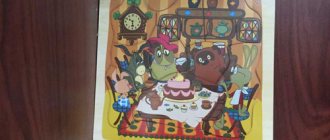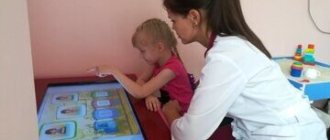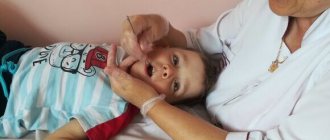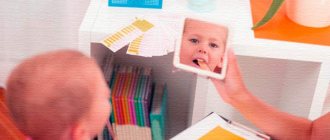Speech is the highest mental function, the most important criterion by which the overall development of a child is assessed. The development of speech is closely related to other mental processes: thinking, memory, imagination, attention. That is why it is important to monitor the child’s speech development in order to promptly identify speech disorders in children , if they occur.
Speech development in each child occurs in its own rhythm, so not all speech delays or disorders in children should be considered pathologies. Researchers identify several stages of speech formation by month and year:
- From birth to 4 months, a child without speech impairments should react emotionally to the voices of adults, cooing, smiling, crying.
- By the age of one year, a child should learn to pronounce simple syllables “ma-ma-ma”, “av-av”, etc.
- From 12 to 18 months, a child should know the names of relatives, respond to them, recognize indicated objects, and know their names.
- Up to two years of age inclusive, a child learns to use simple phrases containing a noun and a verb.
- At 3 and 4 years old, a child without speech impairment can already form long sentences and pronounce sounds relatively clearly.
- By the age of six, a child should speak more than 2,500 words, have correct pronunciation, be able to retell events, and use tenses correctly.
Speech disorders in children are diagnosed if there is a noticeable lag behind these approximate norms. In addition to delayed speech development, there are several types of speech disorders in children, which can also occur in adults.
Causes of speech impairment in children:
The main factors leading to speech disorders in children are divided into external and internal, and sometimes they can be combined. So, what influences the development of speech disorders in children:
- Intrauterine pathologies, heredity
- Birth injuries, prematurity
- Diseases and injuries of the mother during pregnancy
- Maternal alcohol consumption, smoking, exposure to poor environmental conditions, taking medications
- Mother's stress
- Infectious diseases in the first years of life, injuries
- Hearing impairment
Often the cause of speech disorders in children is the environment and surroundings. For normal development, a child needs attention and communication with his parents. Unfortunately, even in prosperous families, children may not be engaged and communicate enough: the child plays with a tablet, phone, toys, but these things do not develop his speech in any way.
Sometimes parents do not try to provoke a conversation with the child - they guess his wishes, immediately fulfill requests, etc. Thus, the child simply does not feel the need to speak. In addition, the child needs constant new impressions; in monotonous living conditions, the child’s development slows down.
Correction
Health care
Therapeutic tactics depend on the etiology of the speech perception disorder. For organic brain lesions, drug therapy with neuroprotectors, neuropeptides, vitamins, and cerebral circulation correctors is necessary. Physical methods of rehabilitation are used: physiotherapy (darsonvalization, electrophoresis, magnetic therapy), therapeutic exercises, mechanotherapy.
For patients with dementia, pharmacotherapy is prescribed by a psychiatrist. Most often, nootropics, antidepressants, antioxidants, cholinesterase inhibitors, and antipsychotics are used to correct mental disorders.
For patients with congenital hearing loss, various types of hearing restoration may be recommended: electroacoustic correction (selection of a hearing aid), cochlear implantation. In the future, to develop understanding of speech and active expression, patients need classes with a teacher of the deaf.
Neuropsychological support
Methods of neuropsychological correction are used in complex therapy of alalia, aphasia, mental retardation, and autistic disorders. As part of cognitive rehabilitation, work is being done to develop HMF; sensorimotor correction involves the formation of a body diagram, spatial representations, non-verbal expression of one’s needs, etc. Various methods are used: neurogymnastics, exercises for interhemispheric interaction, cerebellar stimulation, sand therapy, various types of sensory integration. ABA therapy is recommended for autism.
Speech therapy correction
Speech therapy classes aimed at activating auditory perception play an important role in correcting speech understanding disorders. Main directions of logotherapy:
- development of perception of non-speech sounds (recognition of natural sounds, animal voices, musical instruments, household noises);
- consolidating the objective image of a word (pronouncing a word, showing the object it denotes and writing it);
- work on understanding situational speech (affirmative and negative answers, assimilation of short oral instructions);
- development of phonemic processes (differentiation of phonemes, sound-letter analysis);
- work on the semantic side of speech (working on the understanding of non-situational issues, complex sentences and grammatical phrases, developing the skill of meaningful reading).
A positive effect on restoring speech understanding was noted from the use of finger games, mnemonics, and auditory training using the Tomatis method. In children with ASD, the choice may be made in favor of developing verbal or alternative communication (using gestures, PECS cards).
Types of speech disorders in children:
- Dysphonia (aphonia) is a change in the vocal apparatus due to tension and spasm in the ligaments. With this disease, the voice becomes hoarse, the pitch and timbre change.
- Bradylalia is correct, but very slow speech. There is the opposite of this speech disorder - tachylalia. In this case, speech is greatly accelerated, and individual syllables may be skipped or repeated.
- Stuttering is a disordered speech rhythm that occurs due to convulsions in the speech apparatus.
- Dyslalia is a speech disorder associated with difficulty pronouncing individual phonemes, for example, a lisp and burr.
- Rhinolalia - nasality
- Dysarthria - occurs due to poor mobility of the speech organs, as a result articulation suffers. It also leads to impairments in writing, reading and speech in general.
- Alalia occurs due to underdevelopment of the speech centers of the brain. The disease can be congenital or acquired.
- Aphasia means the loss of already formed functions and is caused by damage to the speech areas of the frontal cortex. With this serious speech disorder, children experience a complete or partial loss of the ability to understand speech addressed to them and to speak themselves.
The most serious speech disorders include alalia, aphasia and their types.
Speech defects
Speech defects affect the quality of life for the worse. The inability to speak clearly is not a dangerous disease, but it can lead to depression and various illnesses. Both children and adults can suffer from this disorder.
In most cases, the situation can be corrected if you contact specialists on time and put in a little effort on your part, following their recommendations. From this article you will learn what a speech defect is, what disorders they include, the causes of the disease and how to overcome it.
Definition of the concept
Speech defects are distorted pronunciation of sounds during a conversation with normal hearing as a result of improper functioning of the articulatory apparatus. Normal speech is considered to be a clear and distinct pronunciation of each sound. At the same time, speech should be smooth and rhythmic, and the words should be recognizable.
Sound reproduction disorders include:
- Lisp is a distortion of hissing and whistling sounds.
- Burr is the lack of skill in clearly pronouncing the sound “R”.
- Nasality (rhinolalia) - air comes out with a sound, as if from the nose.
- Slow pace and rhythm of speech (bradylalia).
- Distortion, “swallowing,” or substitution of sounds when pronouncing words (dyslalia).
- Stuttering is the inability to say words on the first try without prolonged pronunciation of sounds and long pauses between them.
- Complete or partial absence of speech (alalia).
If any of the above types of illness are present or appear, it is recommended to contact a professional—a speech therapist or speech pathologist. The situation can be corrected at different ages, but you should not delay with this problem in order to avoid permanent consolidation of violations. This is especially true for deviations from the norm in children. Treatment at an early age ensures that the child learns to speak correctly and beautifully.
Causes of slurred speech
The causes may be congenital speech impairment due to any negative impact on the fetus during pregnancy or childbirth (for example, hypoxia - oxygen starvation) and acquired speech impairment due to diseases, physical or psychological trauma:
- birth head injuries;
- genetic factors (heredity);
- congenital anomalies (deafness, non-fusion of the upper lip, hard and soft palate, malocclusion, defects of the jaws, teeth, tongue and lips);
- emotional shock (stress, severe fear or shock);
- disruption of the central nervous system;
- contusion;
- consequences of infectious diseases;
- damage or abnormal formation of the speech apparatus;
- consequences of surgical intervention in the area of the speech apparatus;
- an example of incorrect pronunciation on the part of adults.
In the process of pronouncing speech sounds, several organs are simultaneously involved - the brain, larynx, muscles of the face, tongue and respiratory organs. Defects that are associated with irreversible deformation of the speech organs, resulting from mechanical damage - injuries to the throat, nose, tongue, skull or respiratory tract cannot be corrected.
Methods for getting rid of speech defects
There are many causes of speech disorders, and therefore there are many different methods for correcting them. To obtain an effective result, it is very important to establish the true cause of the disease and first of all work with it. Correction tactics for adults and children may be different.
Speech pathologies in adults
In adulthood, they most often occur as a result of illness. To determine or confirm the cause, a specialist will prescribe an examination. And only based on the results, the doctor determines treatment tactics. For example, nasal sound (rhinolalia) is corrected by removing nasal polyps or restoring a deviated nasal septum.
If, after curing the disease (eliminating the underlying cause), normal speech is not restored, then breathing and speech therapy is used. For example, slurred pronunciation, which manifests itself mainly during severe anxiety, can be easily corrected with the help of a set of special breathing exercises.
If speech defects provoke psychological problems, then in this case you will need the help of not only a speech therapist, but also a psychologist or psychotherapist. Group and individual therapy are quite effective.
It is not recommended for a person with speech impairment to avoid people. The fear that people around him will not understand him or will ridicule him is most often far-fetched and unfounded. On the contrary, you need to communicate as much as possible, improving your pronunciation. A person who avoids verbal contact may develop a serious mental illness.
Speech disorders in children
Human speech develops most intensively in the second year of life. If a child does not pronounce some sounds at 3–4 years old, this is considered normal. But if the situation remains unchanged in a five-year-old child, it is a good reason to contact a speech therapist. They will be individually adjusted to an effective program to correct violations.
Sometimes parents themselves are to blame for the problem when they encourage incorrect pronunciation of sounds. Starting from infancy, you need to speak to your child clearly and correctly. And in no case should you “little”, deliberately distorting words, since the baby learns language by copying all the sounds of speech from the people around him.
Depending on the cause, a speech therapist or speech pathologist may prescribe various methods for correcting speech disorders or a combination of them:
- Massage.
- Articulation gymnastics.
- Treatment of nasal diseases, restoration of patency of the nasal passages and sinuses.
- Visiting the dentist to correct a lisp due to malocclusion.
- Medicines to reduce tension in the muscles of the speech apparatus (prescribed by a neurologist).
- Classes on speech development to form the correct pronunciation of words with the help of sound exercises: pronouncing individual sounds, phrases and tongue twisters.
You can get rid of speech disorders through the comprehensive work of several specialists, including a speech therapist, who will help improve pronunciation after eliminating the primary cause.
Phonemic hearing disorder
One of the reasons for incorrect pronunciation is a disorder of phonetic hearing, when a child does not distinguish phonemes of his native language and mixes them up due to poor understanding of the speech of others. From infancy, children gradually master their native language by imitation, and as they grow up, they quickly replenish their vocabulary with new words.
If the baby does not speak for a long time, you need to be wary and pay attention to the problem in order to identify the defect at an early stage. Otherwise, development and learning at school will be difficult. Therefore, the primary task of parents is to pay attention to the problem as early as possible and start working with the baby.
Speech therapy exercises in a playful way that will help develop phonemic hearing. Their parents can carry out the following at home on their own:
- Guessing the sound. The older family member names one sound that the baby must remember. Next, a series of sounds are slowly pronounced, and the child claps his hands when he hears the wish.
- Beating out the rhythm. The parent knocks on the table with his palms or a handy object. The baby must repeat the rhythm.
- Repeat sound combinations after the parent.
- Guessing sounds from pictures. To complete this exercise you need to know the alphabet. The parent pronounces a speech sound, and the child finds it among the pictures.
- The parent deliberately distorts words, including the correct version. The baby claps his hands when he hears the correct sound of the word.
Systematic implementation of a set of speech therapy exercises from simple to complex tasks will help achieve tangible results in eliminating speech disorders in a child. Spending time together doing activities will not only contribute to the development of hearing, but will also bring great joy from communication to both parties.
How to help your child at home?
The result of the work depends on the correct behavior of parents. Under no circumstances should you laugh at a child who speaks poorly, as he may withdraw into himself. Every person, and especially a child, needs to feel needed and loved. Try to pay as much attention to your baby as possible:
- communicate with him on various topics;
- learn poetry and write fairy tales;
- read together and draw illustrations of what you read;
- discuss what you read and come up with your own endings to works;
- listen to music and sing together;
- Be sure to listen to the child without interrupting his story.
Unobtrusive conversation and the above activities, conducted in a playful way, will contribute to the development of speech and thinking. During communication, try to identify the problem and then contact the appropriate specialist.
Recommendations for parents
To avoid problems or begin to eliminate them in a timely manner, parents should follow the advice of professionals:
- From birth, you need to actively talk with your baby, describing to him your actions and surrounding objects.
- Encourage the baby to speak, starting with simple combinations of sounds (“agu”).
- Set an example of correct pronunciation - speak slowly, pronouncing all sounds clearly.
- Do not be overzealous with early development, so as not to overload the fragile psyche of the baby.
- Avoid head injuries.
- If speech disorders occur, seek advice from a speech therapist.
- Follow the instructions of the specialist and exercise regularly - perform the exercises that he recommends.
- There is no need to put pressure on your child, forcing him to study without desire.
- Don't blame yourself for failures.
And most importantly, praise your child for the slightest achievements shown during classes.
Finally
Speech imperfections in childhood are not difficult to correct. An adult will need more effort to eliminate deficiencies, but this is possible thanks to the assistance of professionals, such as specialists from the speech therapy center in Belgorod.
The staff of the center includes speech therapists, speech pathologists, oligophrenopedagogues, teachers of the deaf, and special psychologists. Qualified workers:
- will select an individual correction program;
- will help parents understand the essence of the child’s problem;
- provide advice on speech development issues;
- will test the level of readiness of children for school.
The center provides classes to improve diction and speech technique for both children and adults. For consultation or more detailed information, call the telephone number provided.
Treatment of speech disorders in children
Treatment of speech disorders in children is carried out in several directions - speech therapy, psychological, pedagogical, neurological work with the possible use of medications. The participation of parents and the family environment play a huge role in the success of treatment.
If a children's speech therapist can cope with minor speech disorders, then diseases such as various alalia require an integrated approach and the participation of several specialists, and the treatment itself can be quite lengthy.
In most cases of treatment of speech disorders, positive dynamics are noticeable. However, at school, a child with alalia and aphasia may have problems reading and writing. To improve the integral properties of the brain, children are often prescribed nootropic drugs that improve memory, neural connections, and stimulate mental processes.
Parents should remember that speech disorders in children of preschool age can lead to consequences in the future if correction and treatment are not started.
Manifestations of UO
Mental retardation in a child manifests itself from an early age. It is expressed in reduced intelligence, sensory and motor disorders, and delayed speech formation. Depending on the degree of retardation, the child’s ability to learn, develop and be able to integrate into society is determined. The good news in this case is the fact that MR does not progress over time, and in the case of correctly carried out corrective measures, the condition even improves. However, it must be remembered that a child is capable of developing only within the limits of physiological capabilities. What stands out most clearly is the decline in intelligence and speech development. But for any level of adaptation, formed speech is extremely important. Therefore, one of the most important areas in the correction of children with disabilities is classes with a speech therapist-defectologist.
Working with children with speech disorders
Work with children with speech disorders is carried out in a preschool institution by a speech therapist.
During individual lessons with a child, it is important that other children do not distract him from the process. It is best if training takes place in a separate room or a special speech therapy corner equipped with a large mirror.
IMPORTANT: The speech therapist must carefully monitor the child’s speech and correct any errors in speech. The transition to new material occurs only when the child begins to correctly complete all the proposed tasks.
During the lesson, the teacher speaks the material clearly, loudly, slowly and demands the same from the student. Classes are held at least three times a week.
IMPORTANT: It is necessary to arouse the child’s interest in activities. To do this, you can, for example, tell a fairy tale or, together with your child, compose a story in which he himself will be the main character.
Table of norms of speech skills by age
| Age | Speech skills, vocabulary |
| 1 year | 5-10 simple words denoting a loved one, object or action: mom, baba, bi-bi, give, bang, etc. |
| 2 years | 300-400 words, short sentences, use of verbs, adjectives. |
| 3 years | About 1500 words, use of the pronoun “I”, use of sentences of 3-4 words with the main parts of speech (verbs, adjectives, adverbs, etc.) |
| 4 years | 1500-2000 words, use of prepositions and conjunctions, temporal and spatial concepts. The softened pronunciation of consonants disappears. The child can pronounce hissing (Ш, Ш, etc.) and whistling (S) sounds. |
| 5 years | 2500-3000 words. The use of words is correct, without rearranging syllables and sounds. Using generalizing words (a skirt and a jacket are clothes, etc.) |
| 6-7 years | 3500 words. Figurative words and expressions are used (for example, “neither light nor dawn”), established phrases and sayings. A child can explain the meaning of a simple word and talk about its origin. |
If you liked the article, please share a link to it
Who is a speech therapist: teacher or doctor?
There are different points of view regarding whether a speech therapist is a psychologist, a physician or a teacher. The thing is that speech therapists see patients not only in medical institutions. Today, most kindergartens, schools and correctional educational institutions have a speech therapist position on staff. These specialists work with children directly at their place of education. Such speech therapists are teachers - they have a higher education in speech therapy or defectology, and in their work they are guided by medical data obtained from the patient’s chart. The work of this teacher is closely related to the medical activities of a pediatric neurologist, otolaryngologist, and psychologist, since the causes of speech defects are often due to the presence of any health disorders.
Content:
- Who is a speech therapist: teacher or doctor?
- What does a speech therapist do?
- What organs and mental phenomena does a speech therapist treat?
- Diseases and disorders within the competence of a speech therapist
- The main causes of speech defects
- Reason to contact a speech therapist
- When should you take your child to a speech therapist?
- What diagnostic and treatment methods does a speech therapist use in his work?
Specialists working in medical institutions have a higher medical education, as well as education in the field of defectology or speech therapy, and additional courses of psychotherapy. Unlike teachers, they can prescribe medication as part of the treatment regimen, as well as use psychotherapeutic techniques to help the patient cope with speech disorders.
When is it time to sound the alarm?
By the age of 1 year, the baby should be able to pronounce from 5 to 10 words. If he talks less or doesn't talk at all, that's a red flag.
At 2 years old, children already communicate in simple phrases, use verbs, and their vocabulary is about 200-300 words.
At 3 years old, a child actively uses common phrases - for example: “Masha (has) a Dasha doll.”
It is worth consulting with a speech therapist if the baby still speaks in monosyllabic sentences. You should also contact a specialist if your baby pronounces sounds incorrectly. Another cause for concern is the absence of verbs in speech, the pronoun “I” and the incorrect order and forms of words in sentences.
At the age of 4, children pronounce the sounds Z and S well. They already know how to talk about events that have happened, ask questions and express their thoughts out loud. The children also use words in their speech that denote temporal and spatial concepts (close, far, soon, etc.)
Five-year-old children can pronounce the hissing words Ш, Ж, Ш. They use all parts of speech in sentences and use generalizing words (car, plane is transport, etc.). The children are able to pronounce words without omissions or substitutions of syllables and sounds.
At the age of 6, a child should learn to pronounce the letter P and speak fairly long phrases without mistakes. Children 6-7 years old can correctly use sayings, set expressions, and also explain the meaning of words.
If you have the slightest doubt about speech development, you should contact a speech therapist. The sooner you start acting, the faster you can correct the defect.
Impaired writing
For the first time, parents will realize that their child has problems with written language when teaching him or her to read and write.
Dysgraphia is an incomplete writing disorder that manifests itself in the repetition of the same mistakes when writing:
- replacing syllables or individual letters
- violation of the order of letters in words
- breaking individual words when writing them
Dyslexia is a partial reading disorder. Manifests itself in persistent errors caused by the absence of important mental functions.
Disorders of written speech appear when learning to write








